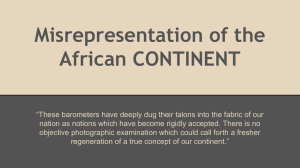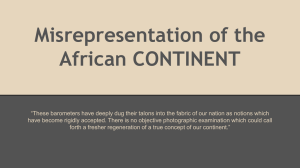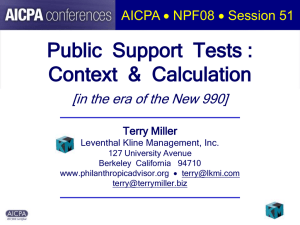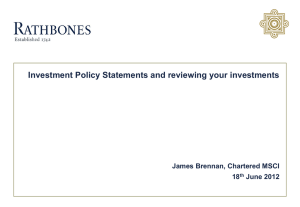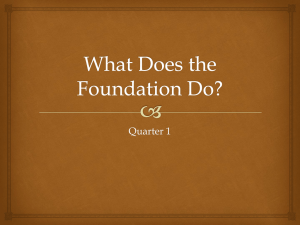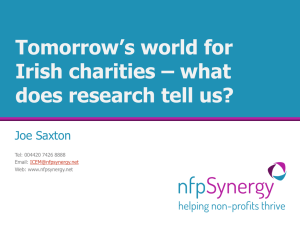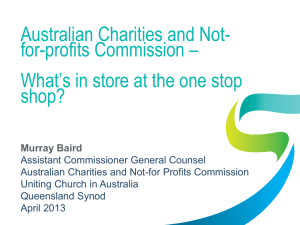Augustus Della-Porta - Sport and Recreation Alliance
advertisement
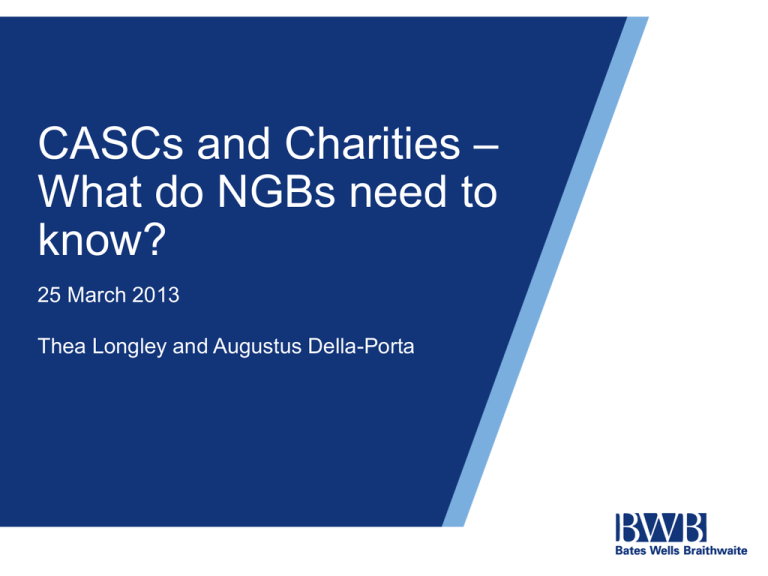
CASCs and Charities – What do NGBs need to know? 25 March 2013 Thea Longley and Augustus Della-Porta What I will cover: • Background For clubs: • Options – CASC and charity • Criteria for registration • Benefits of registration • Main differences For NGB’s: • Options for charitable status Opportunities for NGBs • To promote sustainability of clubs. • Facilitate registration by agreeing model constitution with HMRC and the Charity Commission. • Fund clubs via associated charities. • Register NGB as a charity (if amateur sport only) Background • Re: Nottage. • Encouraging “mere” sport was not charitable. • Sport was only charitable if it furthered another charitable objective, eg. health, relief of disability or education. Background (cont/.) • CASC introduced to offer sports clubs similar tax reliefs to charities with lighter touch regulation. Only membership clubs can apply. • Charitable status is now available for sports clubs. However, charitable status is also an option for delivering other sporting activity, eg. Football Foundation, Rugby Football Foundation, Kick It Out,. Options for Clubs • Three options for sports clubs: – remain as you are; – register as a CASC with HMRC; or – register as a charity with the Charity Commission. Criteria for Registration - CASCs • The club must: – as its main purpose provide facilities and promote participation in one or more eligible sport; – be open to all; – be amateur; – be established within the EU; and – have managers that meet HMRC Fit and Proper Person Test. Criteria for Registration – CASCs (cont/.) • “Eligible Sport” means those listed by HMRC. • “Open to the whole community”, ie: – membership is open to all without discrimination; and – any fees are set at a level that do not pose a significant obstacle to membership or use of the club’s facilities. Criteria for Registration – CASCs (cont/.) • “Amateur” means: – players not paid but expenses can be reimbursed; – player-coaches may be paid; – non-profit making; – any net assets on dissolution are to be applied for approved sporting or charitable purposes; and – it provides the members and guests only with the ordinary benefits of an amateur sports club. Criteria for Registration - Charities • The club must: – either promote community participation in healthy recreation by providing facilities for playing sports or advance amateur sport; – have membership and facilities that are open to all without discrimination; – be amateur; and – be for public benefit. Criteria for Registration – Charities (cont/.) • “Healthy recreation”: – the Charity Commission’s Guidance RR11 currently excludes certain sports from the list, such as angling, ballooning, crossbow, flying and gliding (these are not excluded from the CASC list). Note: The wording of objects in the constitution is important. The Charity Commission currently won’t always accept “advancing amateur sport” Criteria for Registration – Charities (cont/.) • “Open membership”: – similar to that of CASCs. However, a charitable club cannot have social members. It can only have non-playing members that help run the club; – the bar must be run through a separate trading subsidiary; and – it must provide sufficient public benefit which includes a requirement that “those in poverty must not be excluded from the opportunity to benefit”. Benefits of Registration - CASCs • CASCs have exemption from Corporation Tax: – on profits from trading where the turnover of the trade is less than £30,000; – on income from property where the gross income is less than £20,000; – on interest received; and – on chargeable gains. Benefits of Registration – CASCs (cont/.) • For donors: – individuals can make gifts to CASCs using Gift Aid; – relief from IHT on gifts to CASCs; – businesses can give goods or equipment they make, sell or use and get relief for their gifts; and – gifts of charitable assets to CASCs by individuals or companies are Capital Gains Tax free. Benefits of Registration – CASCs (cont/.) • Rates relief: – 80% mandatory and 20% discretionary rates relief on premises wholly or mainly occupied by the club. Benefits of Registration - Charities • More extensive tax reliefs are available than for CASCs, these are: – exemption from Corporation Tax on all profits derived from fulfilling its charitable purposes; – exemption from Corporation Tax on profits from noncharitable trading on the lower of 25% of turnover or £50,000; – exemption from Corporation Tax on interest received; – exemption from Corporation Tax on Capital Gains; and – exemption from Stamp Duty Land Tax on purchases of property. Benefits of Registration – Charities (cont/.) • For donors: – gifts to charities attract the same reliefs as those for CASCs but, in addition: • companies can make gifts to charities under Gift Aid; • payroll giving; • Income Tax relief on gifts of shares; and • some VAT reliefs may be available, such as zero-rating the construction costs of new buildings. Main differences between Charities and CASCs • Regulation: – CASCs have light touch regulation from HMRC; and – charities are more highly regulated by the Charity Commission. • Social members: – CASCs can have up to 50% social members; and – charities can only have non-playing members that assist with the running of the club. Main differences between Charities and CASCs (cont.) • More tax reliefs for charities. • More types of organisations can register as a charity, eg. leisure centres and non-membership sports organisations. • Unlike a CASC a charity must run the bar through a separate trading company subsidiary. Changes for the CASC regime • Treasury/HMRC have announced a review of CASC status • New legislation in the Autumn • Consultation is coming- please get involved Charities for NGBs • Could the NGB register as a charity? • What about an associated charity? What do charities do? • Education • Promoting community participation in healthy recreation • Promoting other charitable purposes [in association with sport] • Promoting recreation • Promoting amateur sport (Charities Act 2011) Advantages of a charity • Tax relief on donations to the charity • Attractive to funders • Expertise Disadvantages of a charity • Charity regulation – Charity Commission • Administration • Restrictions on activities Relationship with Governing Body • Independence • Corporate relationship • Funding relationship • Cross charging • VAT groups • Tainted Donation Regulation Charities Act a (slow) New Dawn? • Sport • Amateur • Charity Commission Guidance in the pipeline Thea Longley Augustus Della-Porta Bates Wells & Braithwaite London LLP 2-6 Cannon Street London EC4M 6YH Bates Wells & Braithwaite London LLP 2-6 Cannon Street London EC4M 6YH Tel: 020 7551 7777 Fax: 020 7551 7600 Email: t.longley@bwbllp.com Tel: 020 7551 7777 Fax: 020 7551 7600 Email: a.dellaporta@bwbllp.com Workshop locations
